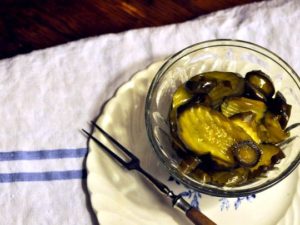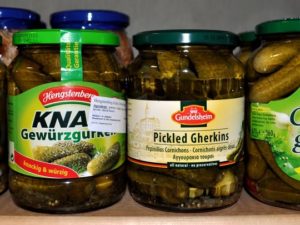Let’s Talk Food: Pucker up for plentiful pickles!
By Doris Reynolds – Naples Daily News
What did Cleopatra, Queen Victoria, Napoleon, Aristotle, Andy Griffith, Elvis Presley and Thomas Jefferson have in common? They were all passionate pickle mavens with a craving for the pungent perfect puckerer.
Long before spas, beauty salons, wellness centers and gyms existed, Queen Cleopatra turned to pickles to enhance her raven locks and luminescent skin. Each day she scarfed down pecks of pickles to enhance her health and beauty. Pickles were the beauty treatment of Egyptian women who had no Botox, collagen, facelifts, tummy tucks, rhinoplasty, eye lifts, breast augmentation or liposuction. Instead, they visited the pickle packer for sure-fire youth-enhancing treatments.
Julius Caesar was so enchanted by Cleo’s formula for strength and beauty he ordered that a plenitude of pickles be on the menu at his orgies and banquets. His troops also benefited from the rage for pickles. They were included in their daily rations. He could have listened to Aristotle who also was an advocate of pickles and spread the word about their benefits for health and stamina.

Sweet and hot strike the perfect balance in these pickles, great on a sandwich or on the side. (Photo: Ellise Pierce/MCT, MCT)
Queen Victoria was another famous pickle enthusiast. She didn’t bother with pickles as a beauty treatment but she ordered that pickles be at table for every meal. Her zest for pickles also was manifested in her picnic lunches, where they were a part of every outdoor meal.
Our best-known, home-grown pickle proponent, Elvis Presley, had a passion for deep-fried dill pickles. But Elvis was not alone in packing away pickles; his fellow-Americans consume more than 2.5 billion pounds of pickles each year. In case you’re counting, that’s 20 billion pickles. And because it takes almost 4 billion average-sized pickles to reach the moon, all the pickles eaten would reach the moon and back more than twice.
How did the pickle get its name? According to the Encyclopedia of Useless Knowledge, the pickle got its name in the 1300s when English-speaking people mispronounced the name of a Dutch fisherman who specialized in pickling fish. His unpronounceable name, William Beukeiz, supposedly came out: pickle.
The pickle-packing industry in the United States began in 1659, when Dutch farmers in what is now Brooklyn grew cucumbers and sold them to dealers who cured them in barrels and sold them to eager gourmets seeking a pickle fix. In wasn’t until 1820 that pickles were packed in jars. Credit goes to Frenchman Nicholas Appert, who first packed pickles in glass containers.

Pepper’s Deli & Burcher in East Naples offers dozens of pickled vegetables like these gherkins and cornichons. (Photo: Kelly Merritt/Naples Daily News)
Pickle history began sometime around 2030 B.C., when inhabitants of northern India brought cucumber seeds to the Tigris Valley. Soon, cucumber vines were sprouting throughout Europe. Shortly thereafter, people learned to preserve the cukes by pickling them in salty brine. By the 17th century, the crunchy munchies made their debut in the New World.
I can’t guarantee that pickles will cure what ails you, but advocates of folk medicine claim that sour pickles help balance the acid-alkaline content of the body and destroy bacteria in the digestive tract.
Surely you must agree that such a prestigious product deserves accolades and recognition. And leave to the folks in Arkansas to have a yearly picklefest. The people in Atkins, Arkansas, are addicted to pickles and each year they pay homage to the sour and sweet by celebrating with a festival where the pickle rules the day.
With so many great pickles on the grocer’s shelf, I don’t expect you to put up your own pickles. To improve the most paltry pickle, here’s a sure-fire recipe to make pickles even more palatable.
CANDIED SWEET PICKLES
Drain juice from a quart of whole sweet pickles or a quart of sweet pickle chips and discard the juice (easiest to use the chips). Cut each pickle lengthwise if using whole pickles. Place the pickles back in the jar and add 1 stick of cinnamon. Combine in a saucepan: 2 cups sugar, 1 cup apple cider, 1 tablespoon celery seed and 2 teaspoons mustard seed. Bring to a boil, stirring until sugar dissolves. Skim the spices from the sugar/vinegar mixture and put into the jar. Pour hot mixture over the pickles. Put the lid on the jar and leave at room temperature. When pickles have cooled, put in the refrigerator for 7 to 10 days before eating. Will keep for several months if refrigerated.

